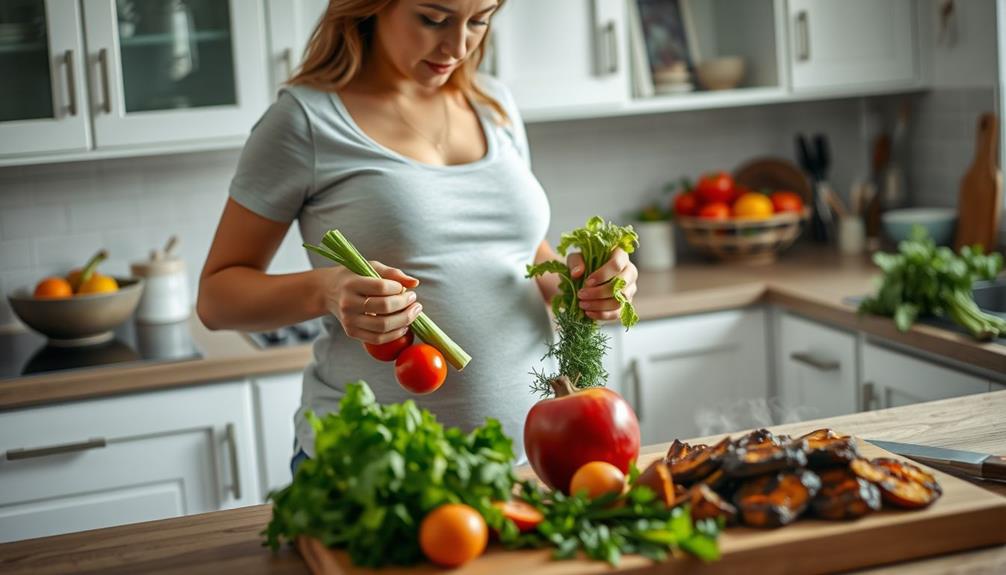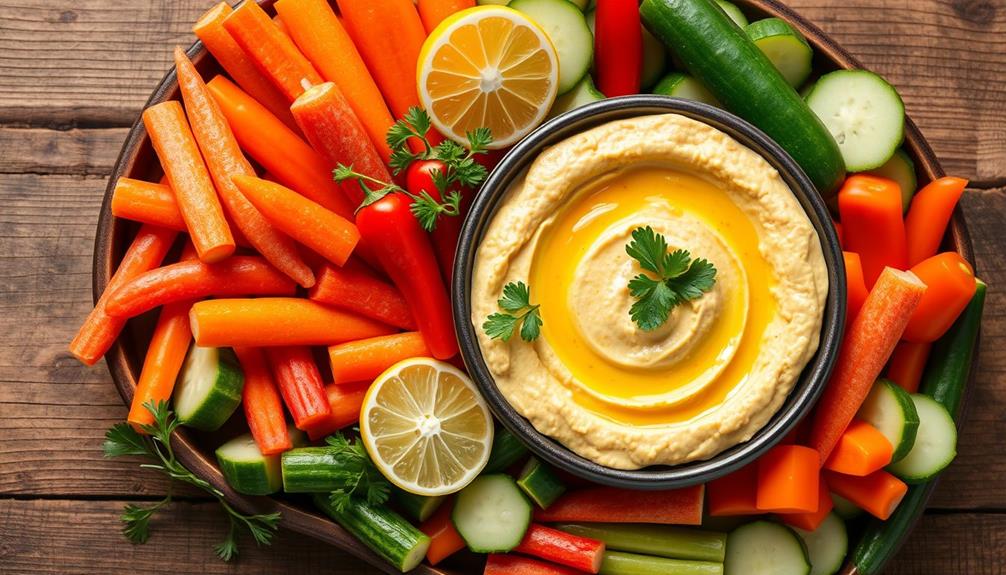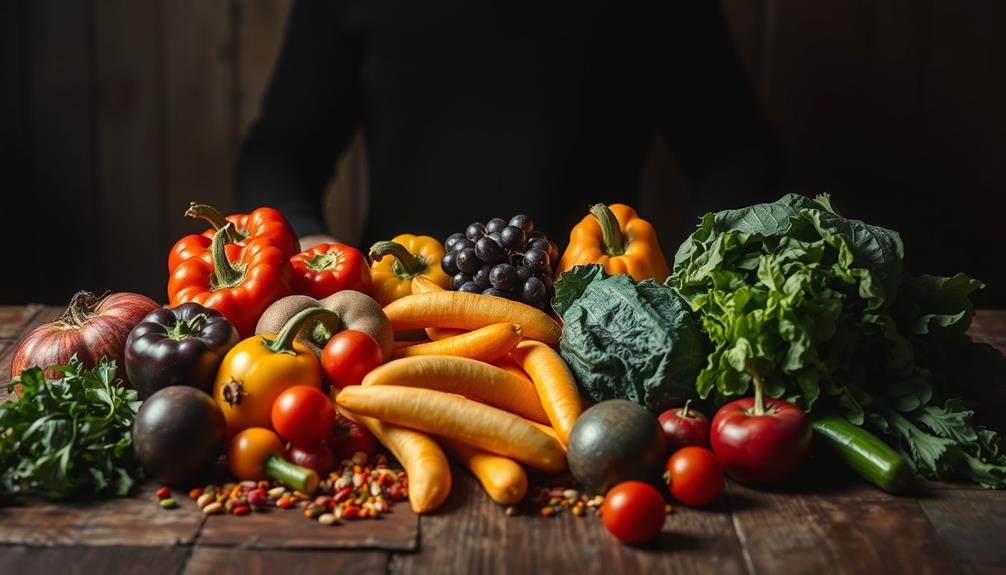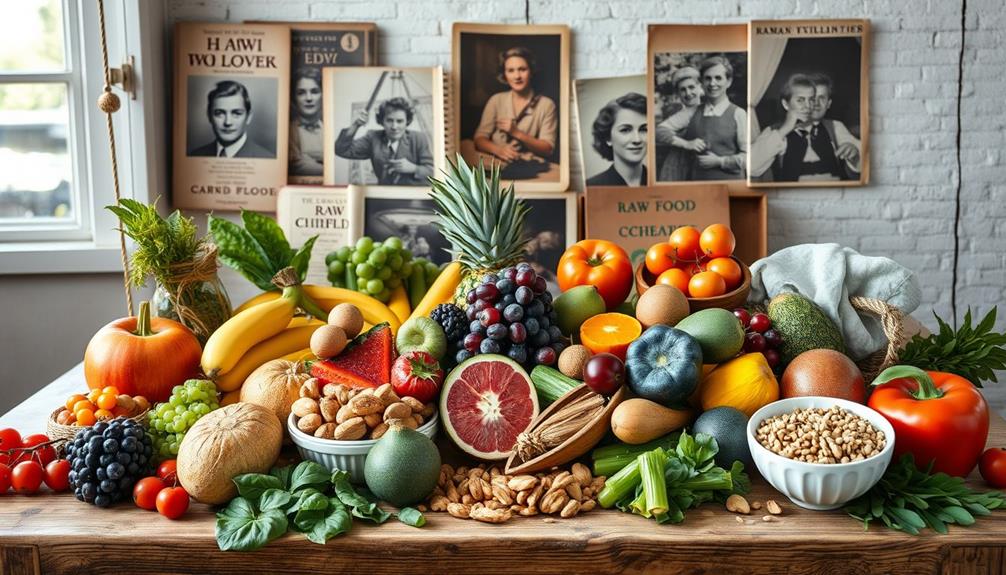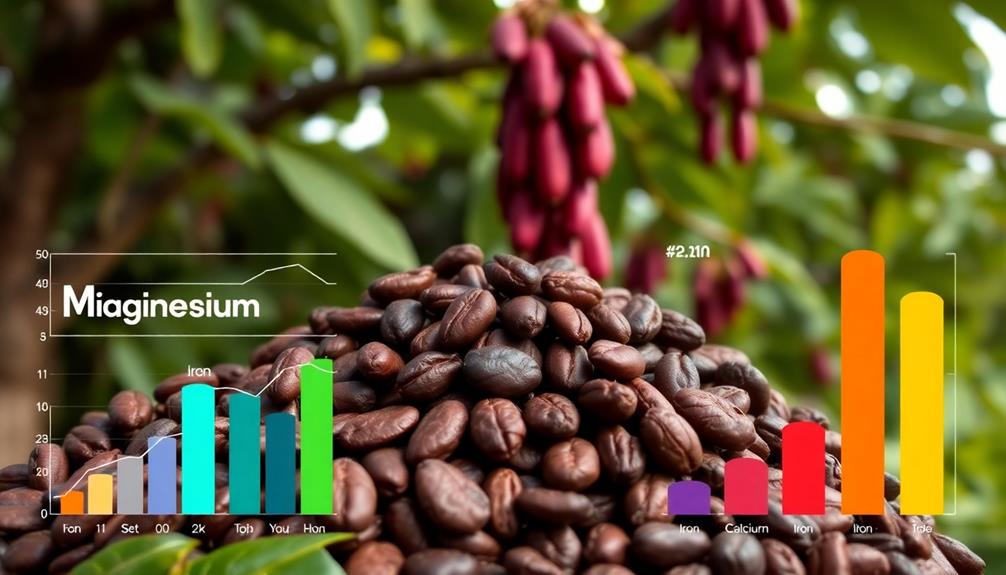Pregnant women can't eat raw foods because their immune systems weaken during this time, increasing susceptibility to harmful bacteria and toxins. Consuming raw or undercooked meats, seafood, and eggs can lead to serious foodborne illnesses like Listeriosis and Salmonella, which can jeopardize both maternal and fetal health. Infections can trigger miscarriages or long-term developmental issues in children. To protect yourself and your baby, it's vital to cook food thoroughly and avoid high-mercury fish. Being mindful of food safety is important during pregnancy, and you'll discover more valuable tips and guidelines to guarantee a healthy journey ahead. It’s also crucial to wash fruits and vegetables thoroughly and avoid unpasteurized dairy products to reduce the risk of consuming harmful bacteria. Additionally, pregnant women should be cautious about consuming raw sprouts, as they can also pose a risk of contamination. Understanding the potential dangers of humans and raw food risks is essential for ensuring a safe and healthy pregnancy. By following these guidelines, you can minimize the chances of foodborne illnesses and create a safe environment for both you and your baby.
Key Takeaways
- Pregnant women have a weakened immune system, increasing vulnerability to foodborne illnesses from raw foods.
- Raw fish and shellfish can introduce harmful bacteria and toxins, risking severe health complications.
- Undercooked meat may harbor Listeria and Salmonella, endangering maternal and fetal health.
- High mercury levels in certain raw fish can impede fetal brain development, causing long-term issues.
- Foodborne illnesses during pregnancy can lead to miscarriage, stillbirth, and developmental delays in the child.
Risks of Consuming Raw Foods
When you're pregnant, your body undergoes significant changes, including a weakened immune system that makes you more vulnerable to foodborne illnesses. Consuming raw fish, like sushi or raw shellfish, can expose you to harmful bacteria and toxins. These pathogens can lead to severe complications, such as miscarriage, stillbirth, or preterm delivery, especially during the important first trimester.
Additionally, maintaining a solid budget for healthy food options is essential for expecting mothers, as nutrition plays a key role in fetal development.
Undercooked meat poses similar risks. It can harbor dangerous bacteria like Listeria and Salmonella, which threaten both your health and your baby's. Additionally, raw fish often contains high levels of mercury, which can hinder fetal brain development and may result in long-term developmental delays.
Toxoplasmosis is another concern associated with raw or undercooked meat. This parasite can cause serious health issues for your unborn child, including congenital defects. Given that the fetal immune system is still developing in the first trimester, it's important to avoid these foods to minimize any risks.
Types of Foodborne Illnesses

Pregnant women need to be especially aware of the various types of foodborne illnesses that can pose significant risks during this delicate time. One of the most concerning is Listeriosis, caused by Listeria monocytogenes, which can lead to severe complications such as miscarriage or stillbirth.
Additionally, understanding cold medications overview can help manage any illnesses that arise during pregnancy. Salmonella is another major threat, often found in undercooked poultry, eggs, and unpasteurized dairy products, leading to symptoms like diarrhea and fever that can be dangerous for you and your baby.
Toxoplasmosis, caused by the Toxoplasma gondii parasite in undercooked meat, can result in neurological damage and developmental delays for the fetus.
Vibrio infections, typically linked to raw or undercooked seafood, can cause gastroenteritis, which is particularly concerning for pregnant women due to weakened immune systems.
Finally, E. coli, often associated with undercooked ground beef and contaminated produce, poses risks of severe gastrointestinal illness, dehydration, and other serious complications during pregnancy.
Being informed about these foodborne illnesses is essential for safeguarding your health and the well-being of your baby. Always prioritize safe food practices to minimize these health risks.
Effects on Pregnancy Outcomes

Foodborne illnesses can have serious effects on pregnancy outcomes, impacting both the mother and the developing fetus. When you consume raw seafood or undercooked foods, you're increasing the risk of infections like listeriosis and salmonellosis.
These infections can lead to devastating complications, especially during the first trimester. In fact, early detection through methods like mammography guidelines emphasizes the importance of monitoring health risks during this significant period.
Here are three essential risks to take into account:
- Miscarriage and Stillbirth: Infections can lead to severe outcomes, including miscarriage or stillbirth, particularly in the early stages of pregnancy.
- Developmental Delays: Congenital infections from raw or undercooked meats can result in developmental delays, affecting your child's future health.
- Infectious Complications: Foodborne illnesses can cause complications like preterm delivery and low birth weight, posing significant risks to both maternal and fetal health.
During the first trimester, your fetus's immune system is still developing, making it more susceptible to pathogens found in contaminated foods.
Consequently, it's vital to avoid raw seafood and undercooked meats to protect both your health and your baby's. Prioritizing food safety during pregnancy helps guarantee better outcomes for you and your developing child.
Long-term Implications for Child Health
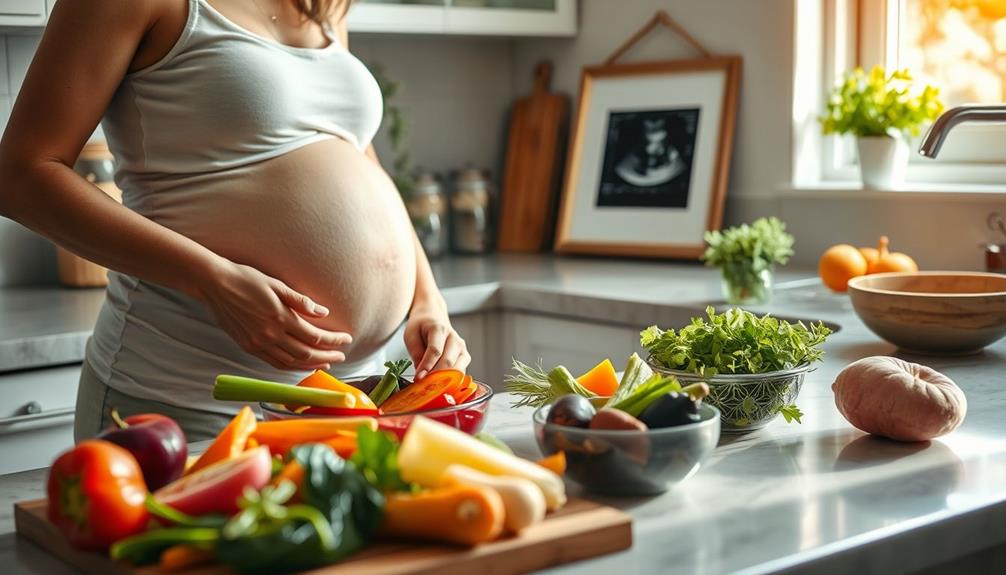
The impact of foodborne illnesses during pregnancy doesn't just end once the baby is born; it can have lasting implications for your child's health. Consuming raw food, particularly raw meats, poses a considerable health risk of food poisoning, which can lead to congenital infections.
These infections may result in developmental delays, vision loss, and hearing impairments that can manifest later in childhood. Moreover, the emotional and psychological stress associated with complications during pregnancy can be comparable to challenges faced by individuals with BPD dynamics in relationships, as both can lead to complex long-term effects on well-being.
For instance, Toxoplasmosis, often linked to raw or undercooked meat, has a 10-15% chance of transmission during the first trimester. This can lead to severe outcomes such as cognitive impairment or difficulties with motor skills. Infants affected by congenital infections may require ongoing monitoring and treatment to manage long-term health complications.
Additionally, the risk of foodborne illnesses during pregnancy is serious, as it can lead to miscarriage and stillbirth, further emphasizing the importance of avoiding raw foods.
Safe Food Handling Practices
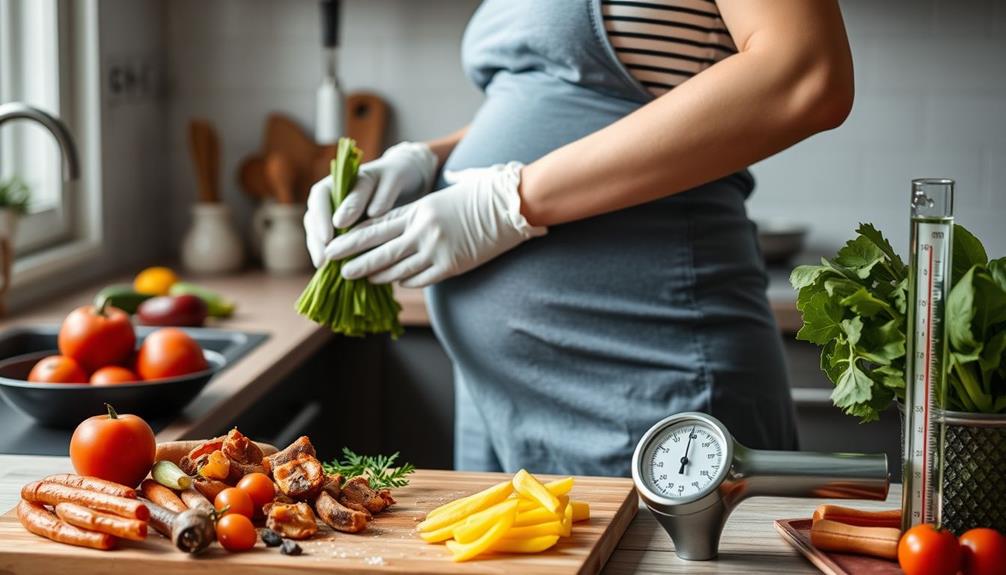
Maintaining safe food handling practices is vital for expecting mothers to protect their health and their baby's development. Following these practices helps minimize the risk of foodborne illnesses that can affect both you and your child.
It's also important to keep in mind that regular cleaning of food prep areas is essential in preventing cross-contamination, which is a considerable risk during pregnancy. Preventing cross-contact guarantees a safer cooking environment.
- Wash hands: Always wash your hands thoroughly with soap and water before handling food. This simple step is essential in minimizing contamination.
- Avoid cross-contamination: Use separate cutting boards for raw meats and ready-to-eat foods. This prevents harmful bacteria from spreading and reduces your risk of foodborne illnesses.
- Cook to safe minimum internal temperatures: Confirm all meats are cooked to the appropriate temperatures—poultry should reach 165°F, ground meats 160°F, and whole cuts like beef or pork 145°F.
Additionally, rinse fruits and vegetables under running water to remove potential pesticides and pathogens.
When you store leftovers, prompt refrigeration is key. Always reheat them to at least 165°F before eating to eliminate any harmful bacteria.
Guidelines for Safe Food Choices
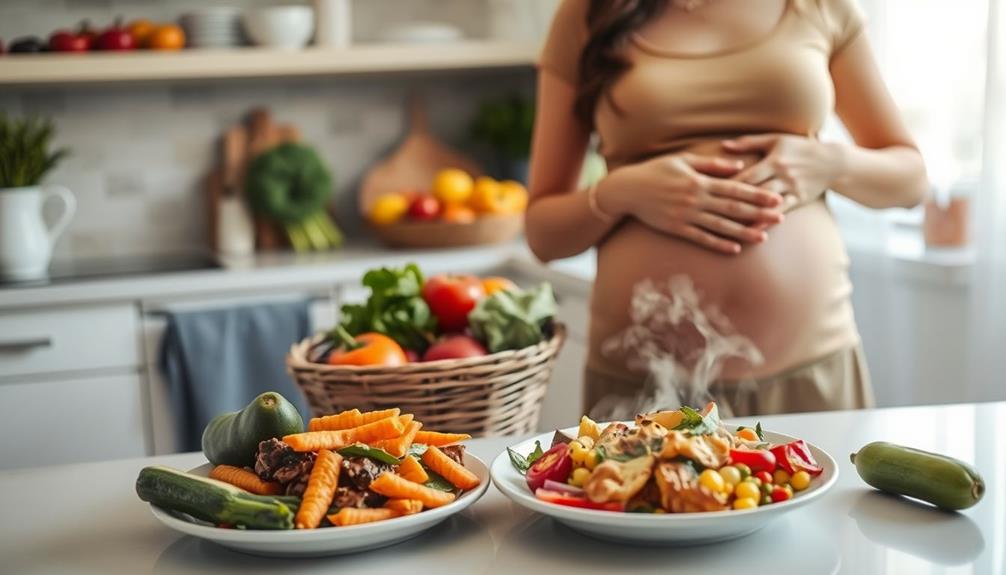
When you're pregnant, making safe food choices is vital for your health and your baby's development. You need to steer clear of raw or undercooked foods and pay attention to safe cooking temperatures to avoid harmful pathogens.
Additionally, incorporating beneficial oils for health can provide various benefits during pregnancy, but it's important to consult with a healthcare professional before use.
Following dietary guidelines can help guarantee you're getting the nutrients you need while keeping risks at bay.
Risks of Raw Foods
Avoiding raw foods during pregnancy is vital for your health and the development of your baby. The risks associated with raw foods can lead to serious health complications, including foodborne illnesses that can harm both you and your child.
Additionally, certain foods, such as raw vegetables and juices, may also pose risks if not properly handled and prepared, so it's important to make certain that all food is cooked and safe for consumption juice diets may lead to nutrient deficiencies.
Here are three key health risks to take into account:
- Harmful Bacteria: Raw meats, poultry, and seafood can contain pathogens like Salmonella and Listeria, which can lead to severe infections. These infections may result in miscarriages or preterm deliveries.
- Raw Eggs: Consuming raw or lightly cooked eggs increases your risk of Salmonella contamination. It's important to avoid dishes that include these ingredients to protect yourself and your baby.
- High-Mercury Fish: Fish like shark and swordfish pose significant risks due to their high mercury content. Mercury exposure can lead to developmental delays and neurological issues in your developing fetus.
Safe Cooking Temperatures
Cooking food to the right temperatures is essential for your safety during pregnancy. To protect yourself and your baby, always adhere to safe cooking temperatures. Whole cuts of meats should reach a minimum internal temperature of 145°F, while ground meats need to hit 160°F. Poultry must be cooked to an internal temperature of 165°F to eliminate harmful bacteria.
Additionally, keeping your home clean and free from allergens is vital, especially for pregnant women; consider investing in best vacuums for dust removal in 2024 to maintain a healthy environment. Avoid raw seafood altogether, as it can harbor pathogens that cause foodborne illnesses; cook it to at least 145°F.
When it comes to eggs, verify both yolks and whites are firm to eliminate the risk of salmonella contamination. Deli meats and hot dogs should be heated until steaming hot to reduce the risk of listeria infection, which can lead to severe complications during pregnancy.
Using a food thermometer is a great way to check that your food has reached these safe cooking temperatures. Additionally, practice good food safety by using separate cutting boards for raw and cooked foods and promptly refrigerating any leftovers.
Pregnant Women Dietary Guidelines
Nutrition plays an essential role during pregnancy, and making informed food choices is essential for both your health and your baby's development. A balanced diet contributes to a healthy pregnancy, while avoiding certain foods can minimize risks associated with foodborne illnesses. Here are three key guidelines to follow:
1. Avoid Raw and Undercooked Foods: Stay away from raw meats, poultry, and seafood. These can harbor harmful bacteria and parasites that increase your risk of foodborne illnesses, jeopardizing your pregnancy.
It's important to maintain a safe environment for food preparation, similar to how one guarantees a clean habitat for pets, such as hamsters, to prevent health issues hamster care essentials.
2. Choose Safe Seafood: Skip high-mercury fish like shark and swordfish entirely. Opt for low-mercury seafood in moderation (8-12 ounces per week) to secure your baby's healthy development without risking exposure to toxins.
3. Guarantee Dairy Safety: Always select pasteurized dairy products. This reduces the risk of listeria contamination, which can lead to severe complications during pregnancy.
Check labels to confirm that all cheeses and milk products are pasteurized.
Additionally, practice safe food handling by thoroughly washing fresh produce and avoiding raw sprouts due to their association with harmful bacteria. Following these dietary guidelines can help protect both you and your baby during this essential time.
Importance of Cooking and Pasteurization
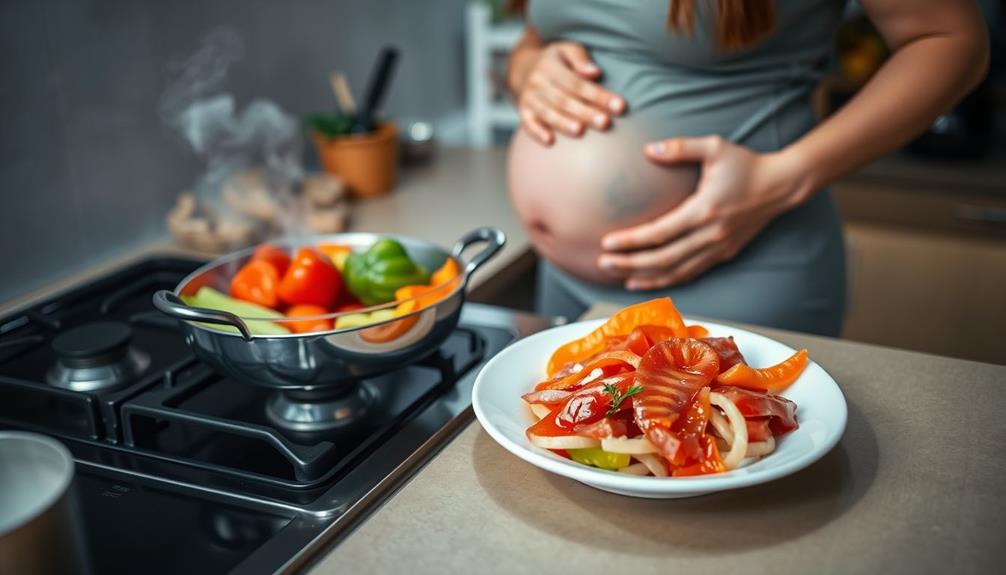
When you're pregnant, it's essential to be aware of the risks of pathogen exposure from undercooked foods.
Cooking meat and seafood to safe temperatures and ensuring dairy is pasteurized can protect you and your baby from harmful bacteria.
Additionally, understanding the importance of financial planning for assisted living can help create a secure environment for your family as you prepare for new responsibilities.
Risks of Pathogen Exposure
Many pregnant women face heightened risks from pathogen exposure, making proper food preparation indispensable. During pregnancy, your immune system changes, increasing susceptibility to harmful pathogens. Consuming raw or undercooked foods can put you at risk for food poisoning, which can have serious consequences for both you and your baby.
Here are three key risks to keep in mind:
- Listeria: Found in unpasteurized dairy and raw seafood, Listeria can lead to severe complications, including miscarriage or stillbirth.
- Salmonella: Commonly associated with raw eggs and undercooked poultry, Salmonella can cause intense gastrointestinal distress, affecting your health and that of your fetus.
- Toxoplasma: Often present in contaminated raw or undercooked meats, Toxoplasma poses a risk of congenital infections if transmitted to your baby.
To safeguard your pregnancy, it's essential to cook meat and seafood to safe internal temperatures and avoid unpasteurized products.
By taking these precautions, you can greatly reduce the risk of pathogen exposure and protect your health and your baby's well-being.
Benefits of Safe Cooking
Guaranteeing your food is safely cooked not only protects you from harmful pathogens but also supports your overall health during pregnancy. Safe cooking practices effectively eliminate bacteria like Listeria and Salmonella, greatly reducing the risk of foodborne illnesses that can jeopardize your pregnancy. The USDA recommends specific internal temperatures to guarantee food safety:
| Food Type | Recommended Internal Temperature | Pathogen of Concern |
|---|---|---|
| Whole cuts of meat | 145°F | Salmonella |
| Ground meats | 160°F | E. coli, Salmonella |
| Poultry | 165°F | Salmonella |
| Deli meats & hot dogs | Steaming hot | Listeria |
| Dairy products | Pasteurized | Listeria |
Additionally, pasteurization kills harmful bacteria in dairy products and juices, making them safer for you. Proper cooking and pasteurization not only enhance food safety but also help preserve the nutritional quality of your meals. By following these guidelines, you can guarantee that you're getting essential nutrients without the added risk of contaminants, promoting a healthier pregnancy for both you and your baby.
Frequently Asked Questions
Why Shouldn't Pregnant Women Eat Raw Food?
You shouldn't eat raw food while pregnant because it increases your risk of foodborne illnesses. Harmful bacteria and parasites can harm both you and your baby, leading to serious health complications or even long-term issues.
Why Should Pregnant Women Avoid Unpasteurized Foods?
You might think unpasteurized foods are just a trendy choice, but they can harbor harmful bacteria. By avoiding them, you protect yourself and your baby from severe infections that could complicate your pregnancy. Stay safe!
What Might Be the Danger in Eating Raw Foods?
Eating raw foods can expose you to harmful bacteria and parasites, increasing your risk of severe foodborne illnesses. These infections can lead to dehydration, hospitalization, and serious complications for both you and your baby.
Why Should Pregnant Women Avoid Processed Foods?
You should avoid processed foods during pregnancy because they often contain unhealthy ingredients, lack essential nutrients, and pose risks like listeria. Focusing on whole foods supports your health and your baby's development.
Conclusion
In conclusion, avoiding raw foods during pregnancy is essential for your health and your baby's development. Just as a sturdy umbrella protects you from unexpected rain, cooking and pasteurizing food shields you from harmful bacteria and viruses. By following safe food handling practices and making informed choices, you can create a healthier environment for you and your growing child. Prioritizing well-cooked meals guarantees you both thrive during this important time. Stay safe and enjoy your culinary journey!

